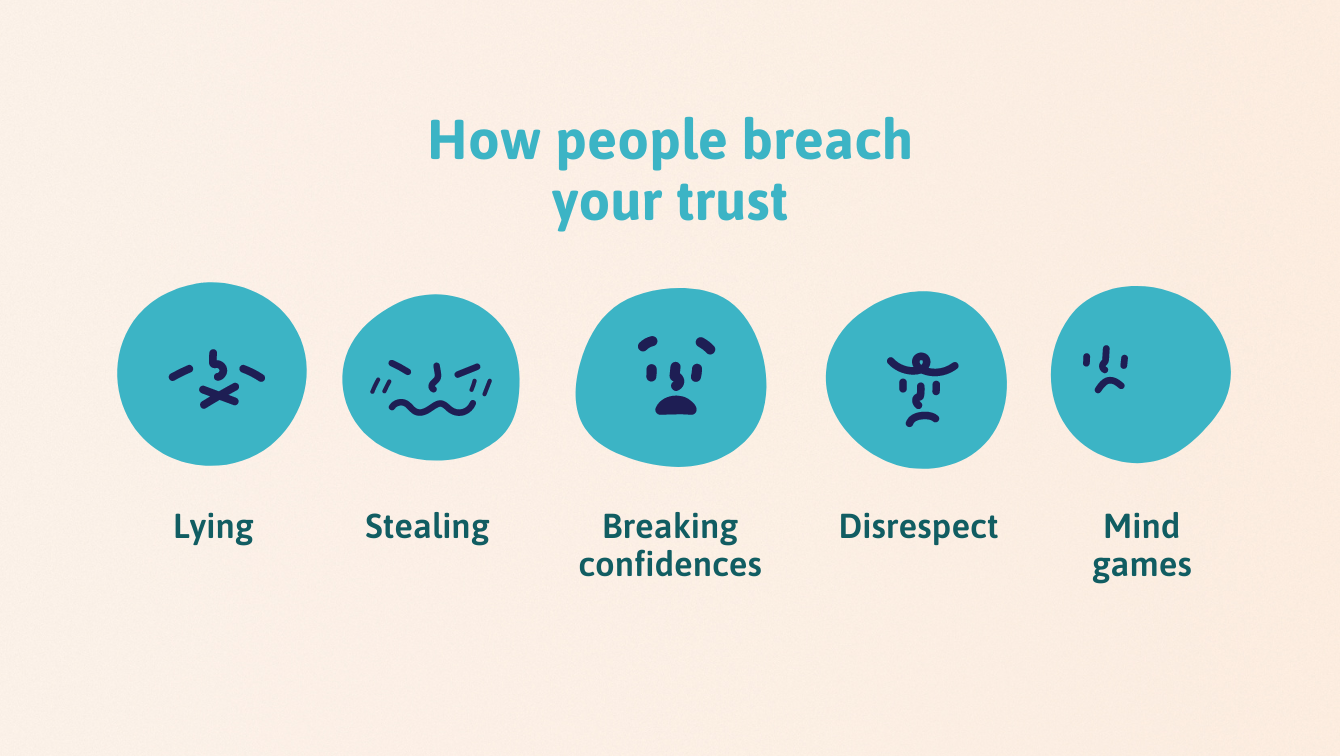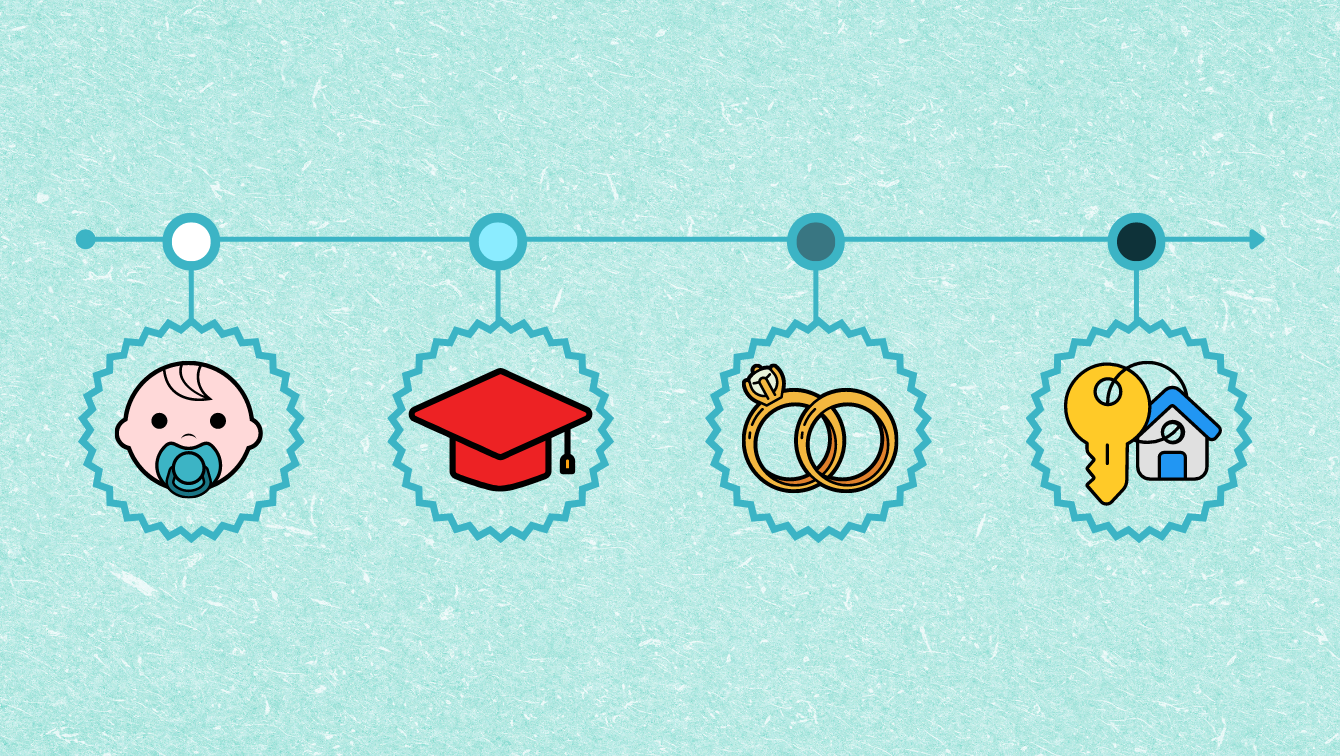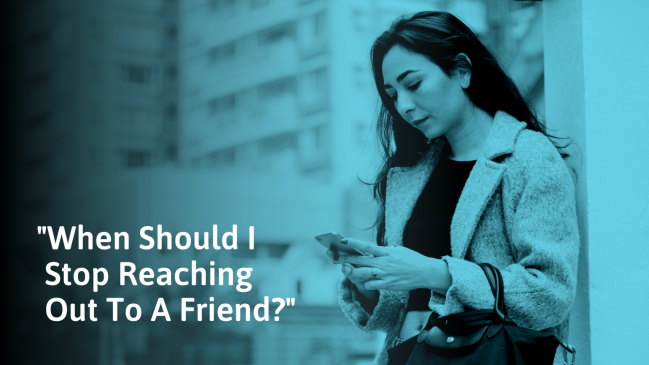Almost all of us want to have a caring, supportive network of friends. We share major life events and fun evenings or weekends. We turn to them in a crisis, and we support them through their hard times.
However much we value our friends, there are times when we need to draw a line under a particular relationship because we’re not getting what we need (and deserve) from it. Deciding to walk away from a friendship can be a big call to make. We’re going to look at the most common signs that your friendship might not be good for you and other explanations for your friend’s behavior.
Sections
- Signs to stop reaching out to a friend
- When you might want to give your friend some space
- How to stop contacting a friend
- Why your friend doesn’t reach you out
- Common questions
Signs it’s time to stop reaching out to a friend
Cutting contact with a friend, or even just stopping reaching out so much, can feel like a big step. Here are the most common signs that your friendship isn’t giving you what you need and it might be time to walk away.
1. You don’t like being the one to reach out
Any conversation or meet-up requires that one person reaches out first. Often, friends reciprocate and reach out to each other at similar rates. This lets both people feel that they are valued and that the other person wants to spend time with them.[1][2]
When only one person reaches out, they can feel resentful and assume the other person doesn’t see their friendship as important. It can feel as though the friendship is one-sided.
Always being the one to reach out can be frustrating, but it doesn’t have to be a reason to cancel a friendship by itself. We’re going to look later at the reasons your friend might not reach out to you, and most of them have nothing to do with not caring about you enough.
If you’re unhappy about always being the one to reach out, it’s often a sign that something else is wrong with your friendship. Consider using this as a warning to look out for other red flags in your friendship rather than a reason to cut off contact.
2. You are being used
Friendship is supposed to be a two-way street. You can be there for your friend and help them out with support, practical assistance, and even financial help sometimes, but they should also be willing to do the same for you. If your friend only contacts you when they want something from you, they probably are using you as a friend of convenience. That might not be the kind of person you want to keep around.
People-pleasers often find themselves in this kind of friendship.[3] They don’t like to say no or leave someone to deal with things by themselves, so they keep giving their time, energy, and resources, without receiving anything back.
If you’re used to helping other people out, it can be difficult to walk away from a friend who is using you. You might feel guilty about letting them down.[4]
If this applies to you, try to remind yourself that you only have a certain amount of energy to give to your friends. Removing yourself from friendships that don’t give you anything can free up more energy to devote to more equal friendships.
3. They have betrayed your trust
If your friend has betrayed you, it’s entirely reasonable for cut ties with them. It is possible to recover from a small betrayal, but major breaches of trust, such as spreading harmful lies about you, might be fatal for your friendship.
Someone who betrays you in lots of smaller ways can do just as much damage to your trust (and the relationship) as one big betrayal.[5] Try to look at their behavior as a whole to decide whether you are able to trust them again. In that case, you might like this article on how to get around trust issues with friends.

Recovering from a betrayal usually requires the other person to acknowledge their actions, apologize for the hurt they have caused and promise to change their behavior in the future.[6] If they don’t, it may be important for you to end the friendship.
4. You realize you’ve grown apart
Some friendships are important to you at a particular point in your life, but they don’t stand the test of time. This isn’t a bad thing. We all learn and grow and change throughout our lives. Growing apart from a friend doesn’t mean either of you has done anything wrong, but it is a sign that you might not want to be as close to them as you were before.
Signs that you’ve grown apart include:
- You don’t have anything to talk about anymore
- You struggle to find things you agree on
- You don’t understand them or feel understood
- When you think of times you’ve enjoyed seeing them, they’re all a long time ago
- Thinking about seeing them leaves you feeling more obligated than excited
- You look for excuses not to catch up
- You feel relieved when they cancel
- You don’t feel comfortable telling them your problems
5. You don’t feel good about yourself with them
Some people might not do anything you can identify as “wrong,” but you just don’t feel good about yourself when you’re with them. You might have different values or want different things from life, or you might find yourself comparing your life with theirs in a way that makes you unhappy. Those are good reasons to stop reaching out.
Try to remind yourself that people don’t need to have done something wrong for you to not want to hang out with them. You only have a limited amount of time, and it’s important that you spend it with people who make your life better in some way.
6. They don’t respect your boundaries
People who care about you should always respect your boundaries.[7] Even if they don’t understand what lies behind your needs, they need to accept it without making a fuss.
Someone who doesn’t respect your boundaries isn’t respecting you. It’s completely ok to stop spending time with them as a result.
You might also like these strategies on how to set boundaries with friends.
7. They stop responding as often as usual
Some friends are a part of your everyday life. You might message them with your morning coffee. Others might be more casual, sending you a reply once a week or less. Either can be a perfectly fulfilling friendship. If someone suddenly stops responding as quickly as they used to, however, it can be a sign that the friendship is starting to fade or that they are taking you for granted.
If you notice a friend is starting to fade away, ask yourself whether you want to try to change that. If you do, try to tell them how you’re feeling. If not, it’s ok to just let the friendship end.
8. They take more energy than they give back
Reaching out to friends is a good way to help you recuperate and re-energize. If you realize that your friend is taking more energy than you get back, it might be time to stop reaching out to them.
This often happens if they have a lot of drama in their life or if they don’t pay as much attention to your needs as they do to their own. You might find yourself listening to all of their stories and helping them to fix their problems but getting little or no support for yourself. Spending less time with friends who drain your energy is an important part of self-care.
9. Your gut is telling you to walk away
Sometimes you honestly don’t know what’s leading you to consider walking away from a friendship. There’s just something in your gut that tells you that spending time with this person isn’t what you need right now.
It’s worth learning to trust that part of yourself. It’s not always easy. Ending a friendship can feel like a failure or as if you’re implying that your former friend is a bad person. You’re not. You’re paying attention to your own feelings and your personal needs.
Times when you might want to cut your friend some slack
We’ve focused mainly on when it’s probably time to reduce contact with a friend. There are some times, however, when you might need to give your friend some leeway. This doesn’t mean you need to put up with unacceptable behavior, but you might want to give them another chance.
1. They’re going through a rough patch
When someone is having a difficult time, they might not have the time or energy to be a good friend. If they’re going through a divorce, for example, they might not feel able to talk about the date you had last week. If you know your friend is going through something exceptional, try not to expect them to reach out to you.
Some friends seem to always have some kind of crisis. Make your own mind up as to whether your friend is just extremely unlucky or someone who thrives off drama. If they’re the latter, they might be a toxic friend.[8]
2. You’re going through a rough patch
If you’re hurting, you might not have the emotional resilience to deal with minor annoyances and frustrations. Those feelings are still valid, but you might want to wait until your situation stabilizes a little before dropping a friend or making an irreversible decision.[9]
3. They’re genuinely trying to change
Making changes can be difficult, especially changing long-standing habits. If your friend is trying to change to become a better friend, it might be worth giving them a little more leeway. This only applies to genuine attempts to change. Repeated promises with no discernible progress aren’t the same as really trying to do better.
4. You’re at different life stages
Major life events can change how your friendships develop. If your friend has just had a child or a major promotion, they might suddenly have less time for socializing and supporting their friends. Try to understand their experience. Sometimes you can find that this even helps build a deeper bond between you.

How to stop contacting a friend
Even once you’ve decided that you want to stop contacting a friend, it can be tricky to know how to go about it. Here are the three main options to end a friendship and when you might want to use them.
1. The slow drift apart
This is where you gradually stop messaging your friend and allow the friendship to lapse without ever talking about it directly. This is especially helpful if you need a break from the friendship but might want to reconnect later.
Some people find this disrespectful, but it is the method least likely to lead to direct conflict or a confrontation.[10][11]
2. The big talk
The opposite approach is to sit your friend down to have a conversation about why you don’t want to be friends with them anymore.
This can be the best option if you find your friend’s behavior intolerable but would like to keep the friendship going if they are willing to work to fix the relationship.
These kinds of conversations can easily turn into a row, so try to think about what you want to say in advance. Check out our article on how to tell a friend they hurt you for ideas about how to prepare.
3. The downgrade
Sometimes you might not want to spend as much time with your friend, but you don’t feel the need to cut off contact completely. You might still be happy to see them at larger social events, for example.
In this case, you might just downgrade how close you consider them. In other words, you might want to try a different level of friendship. For example, they might go from being a best friend to a friend you go for beers with once a month.
This strategy works well for people you were close to in the past but have since drifted away from. You can still retain the parts of the friendship that are meaningful for you, but you don’t need to rely on them anymore or devote lots of time and effort to keeping the friendship going.
Why your friend doesn’t reach out to you
We’ve already mentioned that there are many different reasons your friend might not reach out to you. While it’s undeniably frustrating to always have to be the one to initiate a conversation, here are some of the reasons your friend might be leaving it to you.
1. They don’t like texting or social media
Everyone has their own preferences for how they talk to people. Lots of us love texting and social media, as they let us stay in contact with others for relatively little effort. Not everyone feels the same, however. Some people don’t like texting and find that it takes a lot of emotional effort. They’d much rather catch up in person.
Some people have similar feelings about social media. Social media use has been associated with mental health issues, such as anxiety and low self-confidence, and some people find that avoiding it is important for their mental health.[12]
2. They’re worried about annoying you
When we don’t hear from someone, it’s easy to make assumptions about their motivations. We might believe that they don’t care about us. It might not occur to us that they might be worried about interrupting us or being annoying.
3. They’re really busy
Sending a text only takes a few seconds, so it can be difficult to accept that your friend is too busy to drop you a message. If you think back to times when you’ve been really busy, you might feel more empathy for how difficult it can be to have the emotional and mental energy to start a conversation.
If they message you, they might be worried that you’ll want to hang out and they’ll have to let you down because they don’t have any free time. Sometimes, it can feel easier to wait until they have enough time to have a meaningful conversation rather than just reaching out to say hi.
4. They don’t have much to say
Some people like to reach out to friends for casual conversation, but others will only message when they have something they want to say. If you and your friend aren’t on the same page with this, you can both get frustrated at how the other person deals with your interactions.
5. They take longer than you to start missing someone
Some people just need a longer break before they start to miss you or wonder how you’re doing. In this case, it’s not that they don’t want to reach out to say hi. It’s just that you reach out before they get the chance.
6. They’re having a hard time
Some people pull away from others when they are having a hard time. This is especially common for people with PTSD, anxiety, or depression.[13] They might not feel able to reach out to you or even worry that they don’t deserve help or attention.[14]
If you find out that is the case, these tips on how to support a friend might be helpful.
Common questions
What should I avoid doing if a friend doesn’t reach out?
One common mistake people make when their friend doesn’t contact them enough is to test them by stopping contact. This can come across as insecure and manipulative and often backfires. Giving someone a test they’re unaware of isn’t kind or respectful.




My BF never seems to want to make an effort to do things with me since she moved 50 miles away. It always has to be in “her court” when we get together, never mine. She is always sending me mixed messages about wanting to get together but it never happens. I realize she has a life and family should come first, but it seems like she doesn’t care about me anymore or is ever there when I need her. I’m thinking maybe I should walk away. She said moving away wouldn’t change things between us. but it has and we used to do things together all the time before she moved away. I feel abandoned and hurt.
Maybe just back off for a while and see what happens…
This is where I am with a friend, too. I feel this text gave helpful insights into why someone distances themselves from s friendship. I feel I need to let go of anger/hurt/feeling unimportant toward my friend, but I feel it is much easier when I go no contact for a while. The off-on contact (or what feels like it for me) makes me more frustrated than not interacting at all. Not having contact makes me sad, but I feel this sadness is easier to deal with than getting your hopes up and then feeling disappointed again. It is a little like breaking up. After the first pain is over, it is much easier to have no contact than to see them and have it all flare up again. My friend has phases of reaching out daily when she is having intense feelings she wants to discuss (like dating someone new, for example) for a week or two and then only every 3-4 weeks ( if I don’t call her earlier, that is). I dont know if I am just too sensitive but I feel bad about this.